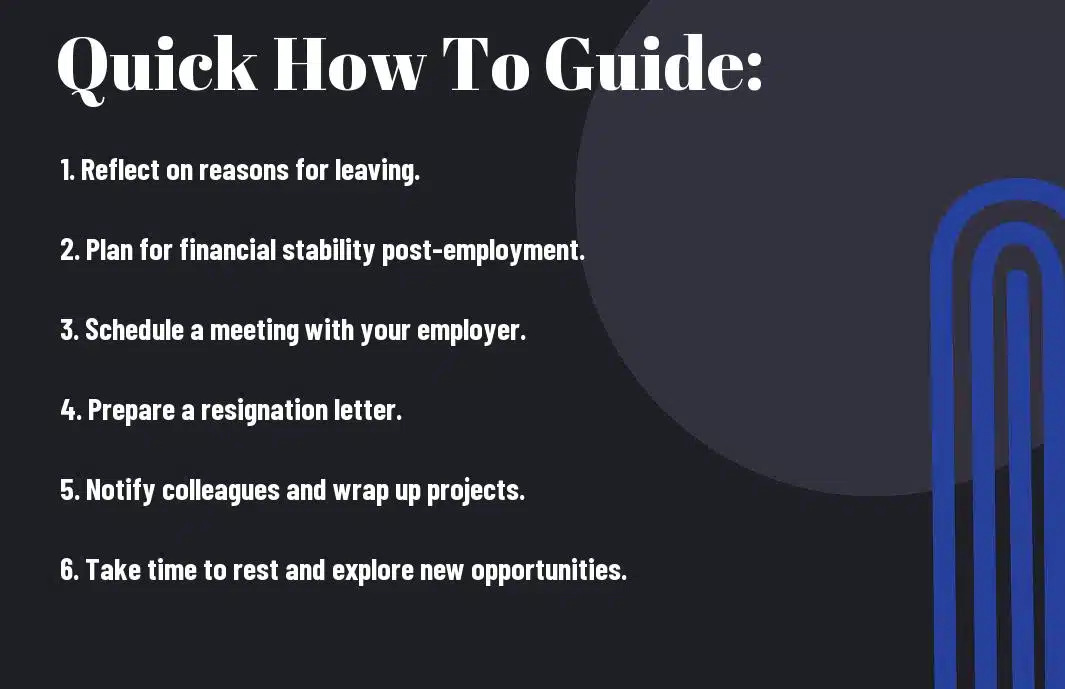Table of Contents
ToggleQuit My Job #Career Have you reached a breaking point in your current job and feel it’s time to move on to bigger and better things? Quitting a job can be a daunting but liberating experience if done correctly. In this guide, I will walk you through the steps to make a smooth exit and transition to your next adventure. From planning your exit strategy to having that tough conversation with your boss, I’ll provide you with valuable tips and tricks to leave your job on a high note. It’s time to take control of your career and make a change for the better!
Key Takeaways:
- Be prepared financially: Before quitting your job, make sure you have enough savings to cover your expenses for a few months.
- Have a plan: It’s important to have a clear plan of what you will do next after leaving your current job. Whether it’s starting a new business, freelancing, or pursuing a passion, having a plan will keep you focused and motivated.
- Communicate professionally: When resigning from your job, be professional and respectful. Provide your employer with a proper notice period and offer to help with the transition process.

Laying the Groundwork
Some How did you quit your job? : r/jobs may ask, “How do I quit my job?” The first step is laying the groundwork by doing some soul-searching and crunching the numbers to ensure you are making a well-thought-out decision.
Soul-Searching: Identifying Your Real Why
Laying the groundwork for quitting your job starts with soul-searching. Ask yourself why you want to quit. Is it because you are no longer passionate about your work, or do you have a bigger purpose calling you? Understanding your real why will give you the clarity and motivation needed to take the next steps boldly.
Crunching the Numbers: Financial Readiness
Laying the groundwork also involves crunching the numbers to ensure you are financially ready to quit your job. Evaluate your savings, expenses, and any potential sources of income. Having a clear picture of your financial situation will help you make a smooth transition without added stress. Note, financial stability is key in this process.
Plus, it’s crucial to have a plan in place for any unexpected financial challenges that may arise after quitting your job. Being prepared for the unknown will give you peace of mind as you launch on this new chapter. Take the time to budget and strategize, so you can confidently take the leap towards pursuing your dreams.
Also Read : How To Decline A Job Offer
Strategy is Key
Many people dream of quitting their jobs to pursue their passions or find better opportunities. However, quitting a job requires careful planning and execution to ensure a smooth transition. If you’re considering leaving your current job, it’s imperative to have a solid strategy in place to make the process as seamless as possible. To learn more about how to quit a job professionally, check out How To Quit a Job in a Professional Manner.
Crafting a Smooth Exit Plan
With careful planning and consideration, you can craft a smooth exit plan that minimizes disruption for both you and your employer. Start by detailing your reasons for leaving and what your next steps will be. Provide ample notice to your employer and offer to help with the transition process. Maintain a positive and professional attitude throughout the resignation process to leave on good terms.
Also Read : How To Get A Job
When resigning, consider how to tie up loose ends, such as completing ongoing projects or training a replacement. Express gratitude for the opportunities and experiences you gained at your current job, and be prepared to hand over any necessary information to ensure a seamless transition for your successor. Bear in mind, leaving a job is a two-way street, and how you exit can impact your reputation and future opportunities.
Timing it Right: When to Drop the News
The timing of your resignation can significantly impact how your departure is perceived. It’s imperative to choose the right moment to share the news with your employer. Consider factors such as the current workload, upcoming projects, and the overall atmosphere in the office. Plan your resignation for a time when it will cause the least disruption and allow for a smooth transition.
Also Read : How To Make Money Without A Job
Professionalism Never Fades
After making the tough decision to quit your job, it’s vital to remember that professionalism should always be at the forefront of your actions. Whether you’ve had a positive or negative experience with your current employer, leaving on a high note will benefit you in the long run. It’s crucial to maintain your composure and handle the resignation process with grace and respect.
Tips for a Classy Goodbye
- Give ample notice: It’s important to provide your employer with a reasonable amount of time to find a replacement for your position. This shows respect for your current company and ensures a smooth transition.
- Express gratitude: Take the time to thank your colleagues and superiors for the opportunities and experiences you’ve had while working at the company. Showing appreciation goes a long way in maintaining positive relationships.
The last thing you want is to burn bridges that could potentially impact your future career opportunities. The key is to leave on a high note and maintain a professional demeanor until your very last day.
How to Handle the Counteroffer Hustle
An important aspect to consider when resigning from your job is how to handle a potential counteroffer. Some employers may try to persuade you to stay by offering more money, a promotion, or other incentives. While this may seem tempting, it’s crucial to think carefully before accepting.
Plus, accepting a counteroffer could leave a negative impression on your current employer and colleagues. It may also result in a temporary fix to underlying issues that led you to consider leaving in the first place. It’s important to weigh the pros and cons carefully and make a decision that aligns with your long-term career goals.
Also Read : How To Find A Job
Life After the Leap
Despite the uncertainty and fear that often come with quitting a job, the decision to take a leap of faith and pursue a new path can be incredibly liberating. If you’re looking for guidance on how to navigate this transition, check out How to quit your job professionally: 6 tips for resigning.
Rebranding Yourself: The Personal Pivot
After quitting your job, it’s important to rebrand yourself and pivot towards your new direction. This is your opportunity to showcase your skills, passions, and unique value proposition to the world. Use this time to update your resume, revamp your online presence, and redefine your personal brand. Embrace the changes and position yourself as a valuable asset in your chosen field.
Note, this is not just a job change – it’s a personal pivot. Stay authentic to who you are and let your passion shine through in everything you do. People are drawn to authenticity, so be bold, be fearless, and show the world what you’re capable of.
Also Read : How To Respectfully Decline A Job Offer
Networking Like a Champ
There’s no denying the power of networking when it comes to forging new opportunities. After quitting your job, make it a priority to connect with industry professionals, attend networking events, and build meaningful relationships. Networking is not just about handing out business cards – it’s about making genuine connections and adding value wherever you go.
Plus, don’t be afraid to step out of your comfort zone and reach out to people who inspire you. You never know where a simple coffee meeting or email exchange could lead. Stay proactive, stay engaged, and watch how doors start to open for you.

Also Read: How To Get A Loan Without A Job
Conclusion
Upon reflecting on the process of quitting your job, it is crucial to prioritize your happiness and fulfillment. Do not let fear hold you back from pursuing your passions and dreams. Take the leap, have a solid plan in place, and trust in your abilities to succeed. Note, life is too short to stay in a job that does not align with your values and aspirations. Quitting your job may be scary, but the rewards of pursuing your true calling are immeasurable. Embrace the challenges, stay focused, and hustle hard to create the life you truly desire. It’s time to take control of your future and make your dreams a reality. Let’s go crush it!
FAQ
Q: Why should I quit my job?
A: Quitting your job can lead to new opportunities, personal growth, and a chance to pursue your passion.
Q: When is the right time to quit my job?
A: The right time to quit your job is when you feel unfulfilled, undervalued, or when it no longer aligns with your goals and values.
Q: How do I prepare financially before quitting my job?
A: Before quitting your job, make sure to have a financial plan in place, including savings to cover living expenses and a buffer for unexpected costs.
Q: Should I quit my job before finding a new one?
A: It’s advisable to secure a new job before quitting your current one to ensure a smooth transition and avoid financial strain.
Q: How do I resign from my job professionally?
A: When resigning from your job, schedule a meeting with your supervisor, provide a formal resignation letter, and offer to help with the transition.
Q: What should I do if I have doubts about quitting my job?
A: If you have doubts about quitting your job, take time to reflect on your reasons for leaving and consider seeking advice from trusted mentors or career coaches.
Q: How do I stay motivated after quitting my job?
A: Stay motivated after quitting your job by setting clear goals, staying focused on your passion, and surrounding yourself with a supportive network.





